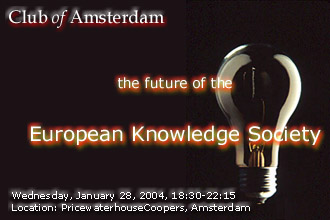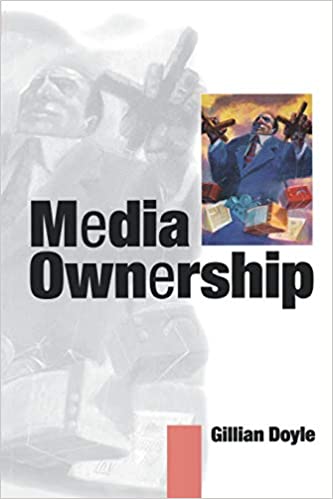
Content
Q&A with Michel Mol

Michel Mol, Internet Coordinator, Netherlands Broadcasting Corporation
Club of Amsterdam: European countries prefer open code software for their administration. They want to stay independent from monopolising enterprises. Do you see similar developments in the media landscape?
Michel Mol: The problem of choice online is overwhelming, as are the accompanying dilemmas: who chooses with what impact and on what basis: content producer, publisher, user, society (links to your AOL statements, branding issues, etc.). From what portfolio: only their native language content (language segregation of the web), their trusted brand, their peer-endorsed sites? Is complete paralysis of choice freedom? How does electronic media enhance or prohibit democratic issues as civil society / citizenship. (so no answer here, just more questions: so we can afterwards be “still confused, but on a higher level”:-)
Can you describe the role of public broadcasting in 20 years?
Michel Mol: Public Broadcasting will not exist in 20 years. Each movement/school of thought, each individual idea will have its own context, i.e. support group with content and debate around that content, rated by users and recognized experts. In the intermediary state broadcasters might facilitate the choosing process through a newly defined role as guide. So broadcasters will move from content producers to aggregators, to guides, to tool suppliers for users to help themselves, to do a final handover before the 20 years are up. In Holland these developments are already being started in parallel through debate-portals etc.
Can you give us an example of a sustainable business model for future television?
Michel Mol: Commercial television will be profitable long after distribution has switched to IP (through the internet), streaming or downloadable: with rights management and billing tools for the masses always one step behind the commercial-free downloadable hacked-versions for the few.
Michel Mol speaks at our Club of Amsterdam Event about
the future of the Media & Entertainment Industry on Thursday, November 27, 18:30-22:15!
About the future of the Media & Entertainment Industry

Things That Think
Things That Think (TTT) brings together a wide variety of sponsor companies and organizations with 25 Media Lab research groups working toward a common goal: to design and invent the future of digitally augmented things. Research areas range from penny-priced PCs that provide rural market access in developing countries, to powerless switches that wirelessly communicate messages, to clay that provides real-time computational analysis of physical landscape models. From new musical instruments for both children and virtuosic artists, to a new generation of cars for the digital world, TTT’s paradigm-breaking perspective is developing the products and services of tomorrow.

No growth in global music sales before 2005
The value of global music sales will continue to fall in the years to 2005, according to a new report by Informa Media Group. The report, The Global music industry (3rd edition), estimates that the global value will drop below $28 billion in 2004 before returning to growth in 2005, driven primarily by the restriction of online file exchange coupled with greater control of CD copying. By the end of 2008 the value of global sales is estimated to have risen to $32 billion.
For 2003 the value of the world’s music sales is forecast to fall for the fourth year in succession. Informa Media estimates the decrease in the retail value will be 8.9%, reducing the overall value of sales to $28.2 billion. CD sales, which fell for the first time in 2001, are forecast to decrease for a third year – by 8% to 2.1 billion units.
News about the Future
Philips invents intelligent biomedical clothing for personal healthcare
Scientists at Philips Research in Aachen, Germany, have developed a wearable, wireless monitoring system that can warn patients with underlying health problems, assist clinicians in the diagnosis and monitoring of patients at risk, and automatically alert emergency services in the event of and acute medical event. Based on dry-electrode technology that can be built into common items of clothing such as bras, briefs or waist belts, Philips’ wireless monitoring technology continuously monitors the wearer’s body signals such as the heart activity to detect abnormal health conditions. The new technology enables the development of a new category of products in the personal healthcare area.Worn continuously by the patient, the new wireless monitoring systems are capable of storing up to three months data of body signals such as heart-rate information in their 64 Mbytes of internal memory. This provides clinicians with a continuous history over an extended period of time to assist in an accurate diagnosis. Throughout this time, advanced analysis algorithms executed on the system’s ultra-low power consumption Digital Signal Processor (DSP) continuously monitor and record any abnormal signal. In the event of a serious health condition being detected the system can trigger local alarms or wirelessly link with cellular or public switched telephone networks to summon immediate help.
All the active electronics for an online monitoring system are incorporated into an ultra-slim module that slips into a dedicated pocket in the garment. Once this module is removed, the garment with the built-in dry electrodes can be laundered.
Gravity Probe B
Gravity Probe B is the relativity gyroscope experiment being developed by NASA and Stanford University to test two extraordinary, unverified predictions of Albert Einstein’s general theory of relativity.
The experiment will check, very precisely, tiny changes in the direction of spin of four gyroscopes contained in an Earth satellite orbiting at 400-mile altitude directly over the poles. So free are the gyroscopes from disturbance that they will provide an almost perfect space-time reference system. They will measure how space and time are warped by the presence of the Earth, and, more profoundly, how the Earth’s rotation drags space-time around with it. These effects, though small for the Earth, have far-reaching implications for the nature of matter and the structure of the Universe.
Wednesday, January, 2004
The European Design Centre
Projects by the European Design Centre:
DeGap
DeGap is a research project supported by the European Commission. The main goal is to find and determine methods of closing the gap between designers, engineers and marketers. It is cooperating with a number of organizations, institutes and design studios from all over Europe.
iBuild [Dutch]
iBuild is software for Interior Design, architecture, construction and urban planning. It is a tool to assemble predefined elements and directly view the three dimensional appearance. It is easy to change colors / materials. When you finalize the model, it can automatically generate the list of items, delivery dates and costs.
Emopay [Dutch]
European Mobility and Payment Systems
Emopay is a payment system based on GSM and GPRS technology. The SIM card is used as an identification, user can by calling or sanding an sms execute transactions. At this stage Emopay offers payment for gas at the tank stations and usage of parking facilities – in garages or as street parking. Emopay is a fast and secure method of payment, which does not require any complex and expensive hardware.
Design Management
In 2001 EDC and it’s partners organized the first edition of European Design Management Award. The case studies from six European countries have been collected and analized, and companies which manifested the bast practice of design management were awarded. EDMA was part of activities of MadeIT, innovation project founded by the European Commission, managed by EDC.
Klas van de Toekomst
This is a project running in cooperation with the Municipality of Eindhoven. The main goal is to promote technology and technology related professions among the young and at the same time let children create their own vision of the future in the field of education.
Recommended Book
Media Ownership: Concentration, Convergence and Public Policy
by Gillian Doyle (Author)
The digital revolution is transforming media and communications industries worldwide, and media companies are keen to emerge at the forefront of an increasingly transnational and competitive communications marketplace. However, the volume and scale of mergers and alliances involving media players has raised considerable challenges for regulators and state authorities alike.
PricewaterhouseCoopers is a supporter of the Club of Amsterdam.

Sponsor of the Club of Amsterdam event about ‘the future of the Media & Entertainment Industry’ on Thursday, November 27:

The Club of Amsterdam Round Table: Henrik Brameus

Henrik Brameus, Benitel
Is it time to add to the basic human rights? In December it is 55 years since the United Nations General Assembly adopted resolution 217 A (III), the Universal Declaration of Human Rights. In spite of that there are a lot of things going on in our world right now that seriously violates those laws. Unilateral wars, unpredictable terrorist attacks and state sanctioned violations of democratic rights. I’m not going to give specific examples, because I will always leave something important out. To me these developments are regularly making my view of the future gloomy.
I got to think about this after one of the recent round table sessions where we presented our view of our personal future 30 years from now. Although the results were very different in contents and process, my memory is that one thing seemed important to everybody. It was neither fame nor fortune. It was happiness. We all wanted to do something fulfilling have meaningful relationships and feel at peace with ourselves.
To me it looks as if one of the things we need to make important is to pursue your own happiness. I would even go as far as to say that it should be a basic human right that everybody has the right to pursue their own happiness, assuming that you don’t intentionally hurt other people along the way. The pursuit of happiness is a choice that we can make that will have an impact not only on our own lives, but also on society as a whole.
If you want to shape your own future, I think deciding to pursue happiness is one of the most important and positive decisions you can make.
The Universal Declaration of Human Rights
Club of Amsterdam Events 2003/2004
| October 28, 2003 | the future of Food & Biotech |
| November 27, 2003 | the future of the Media & Entertainment Industry |
| January 28, 2004 | the future of the European Knowledge Society |
| February 18, 2004 | the future of Education & Learning |
| March 31, 2004 | the future of Energy – the Hydrogen Economy? |
| April 28, 2004 | the future of Healthcare & Technology |
| May 19, 2004 | the future of Architecture |
| June 23, 2004 | the future of Culture & Religion |









Customer Reviews
Thanks for submitting your comment!